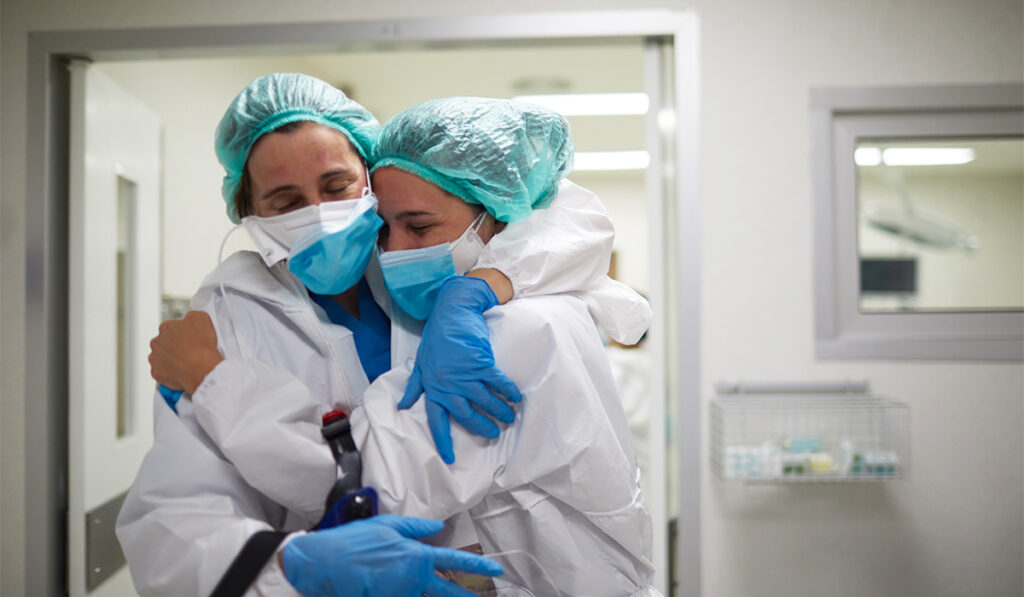The senior director of Nursing Diversity and Inclusion at Vanderbilt University Medical Center has long been fighting to make fellow nurses feel valued and appreciated.
Five years ago, Mamie Williams, Ph.D., M.P.H., A.P.R.N, worked with executive nurse leadership to forge a structured role in the organization to support to nurses’ overall health.
Today, Williams serves nationwide as co-chair of the American Nurses Association’s (ANA) Healthy Nurse, Healthy Nation (HNHN) Advisory Committee.
Among her top goals is reinstituting the legacy of nursing as “among the most trusted professions,” Williams said.
“Since the onset of COVID-19, patients expressed mistrust to the medical community – and nurses became increasingly frustrated, under attack and exhausted physically and emotionally,” she said. “At times they were asked to work beyond human limits.”
In response, Vanderbilt has established a team and shared-governance process to ensure policies are in place that protect nurses, that data is tracked and addressed, and that their own culture of safety is held to the highest standard. Patients and visitors are considered key players in that culture, as well.
According to a National Institute for Occupational Safety and Health (NIOSH) survey cited by Williams, 45% of nurses felt they were not receiving enough emotional support since the onset of COVID-19.
Reasons listed in the report included long work hours, rotating and irregular shifts, and intense physical and emotional labor, among other factors, Williams said. Additional concerns reported were around the level of increased exposure to human suffering and death and increased risk of exposure to disease and violence that nurses encounter.
The report also noted that a sizable number of physicians and nurses report experiencing healthcare “burnout,” a condition that has been associated with decreased career satisfaction and out of kilter work-life balance.
Nurse Health Concerns
“There is no question that nurses’ health has suffered,” Williams said. “What surprises people is that it is worse than that of the general population.”
Research by Healthy Nurse, Healthy Nation found that nurses are more likely to be overweight, have higher levels of stress, and get less sleep than the average American. In addition, they are confronted with workplace violence and undergo musculoskeletal injuries which contribute to poor health, Williams said.
“Both shift work and lack of sleep take a toll both physically and emotionally on nurses,” she continued. “The majority of nurses I know do not have the time to shop for healthy food, prepare healthy meals, or exercise.”
Another factor is the emotional toll that is integral to the profession.
“Nurses are expected to not complain and move on from sick and sometimes dying patients without a break,” Williams said. “Nurses are not given enough time to grieve when a patient dies. They need the time.”
The American Nursing Association conducted a Health Risk Appraisal (HRA) that was designed to address the lack of study data on registered nurse- and student nurse-specific health and wellness. More than 14,000 registered nurses and nursing students took the survey, and the results were clear, Williams said.
“Nurses’ health and quality of life needed to be improved in many areas, but there were few effective workplace programs to address issues,” she said. These issues include safe patient handling, needle-stick prevention, workplace violence prevention and stress reduction.
“There was also a lack of wellness programs available to nurses care,” Williams continued. “A whopping 68 percent of those surveyed said that they put the health of their patients ahead of their own health and safety. Nurses cannot give the best care to their patients when they are not operating at their best.”
Danger to Themselves
Nurses have one of highest rates of suicide of all professions, noted Williams, who authored an article on the subject for JAMA Psychiatry.
“We face a lack of autonomy, not being supported,” Williams said. “Nurses are not supposed to complain and are not used to advocating for themselves. But they have to do it, and we will help them.
Health care institutions must work to destigmatize mental health care as a resource for nurses and to establish programs to meet those needs, as well as work to improve the physical and emotional safety of the workplace, she said.
In June 2023, Sarrah Sponholtz, M.S.N., R.N., was appointed as director of Nurse Safety and Well-Being at VUMC, a position Williams helped introduce.
“With a nurse-staffing crisis now underway following the patient overload of the pandemic, work stress continues to rise,” Spohnholtz said. “But nurse burnout does not have a one-size-fits-all solution.”
Beyond individual nurse care, she advocates for revisions to a health care system that imposes such emotional fatigue.
She encourages nurses who feel they are burned out to get in touch with someone they trust and talk about it. She also singles out nurse safety as a key area, driven by data on nurse injury rates and prevention that make nursing among the highest-risk professions for workplace injuries.
“We want to protect our nurses by ensuring they have the proper equipment and resources to protect our overall health from occupational hazards and overexertion injuries,” Spohnholtz said. “We are also protecting our nurses from workplace violence as a top priority.”
Nurses face some of the highest rates of violence within the health care field, which already faces greater incidences of violence than most, Spohnholtz said. Threats and verbal abuse are not uncommon.
“It is our mission to ensure that the families we serve understand that we are all in this together, and we need to be kind to one another,” Spohnholtz said.




